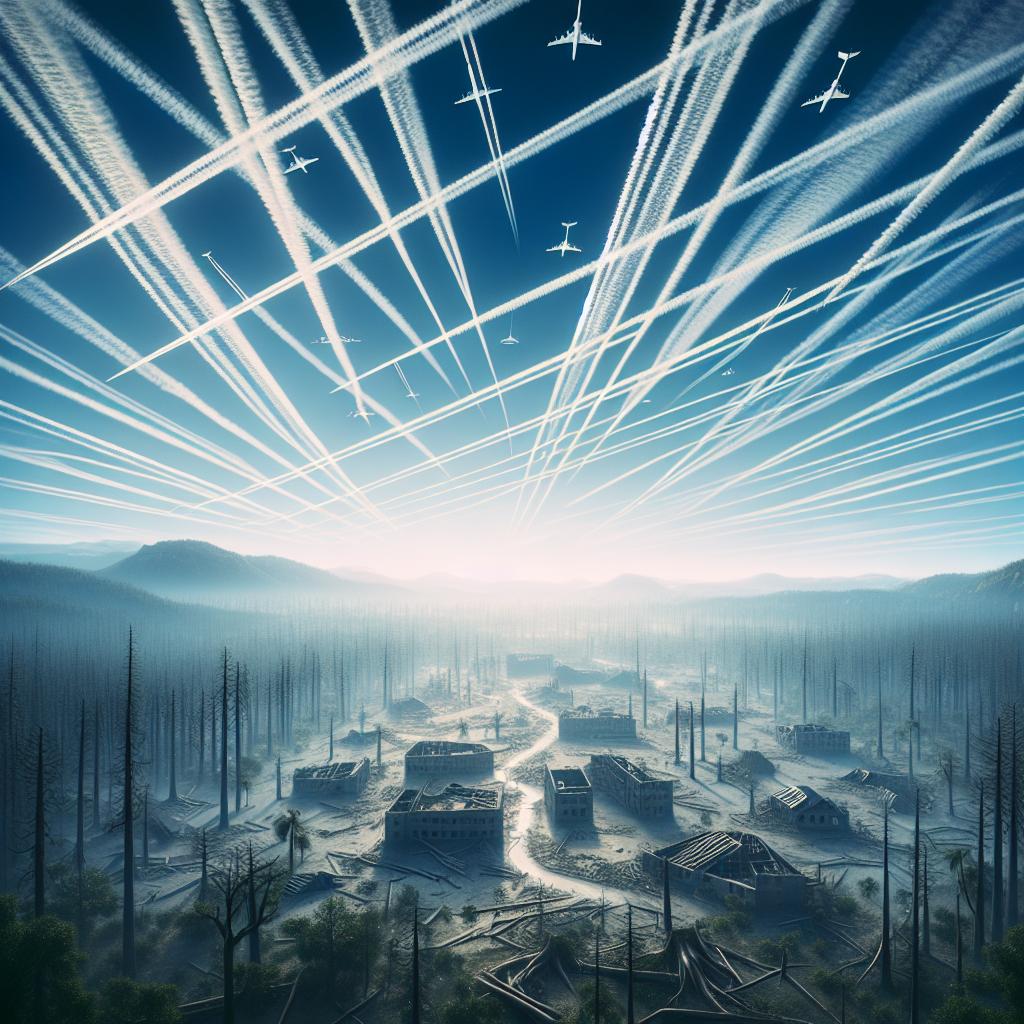

Chemtrails over hurricane aftermath.
In a surprising twist, a wave of conspiracy theories is making headlines following the past hurricanes, specifically Hurricanes Helene and Milton. Many are connecting these powerful storms to long-standing myths about chemtrails, a term used to describe the idea that trails left by aircraft contain toxic chemicals released by the government. This notion has garnered fresh attention on various online platforms, particularly among right-wing influencers who are promoting a range of claims linking these hurricanes to a supposed plan to affect the upcoming presidential election.
Over the years, the chemtail conspiracy theory has become well-established in some circles. Believers assert that the condensation trails—known scientifically as contrails—are not just water vapor but are laden with hazardous substances intended for weather modification or mind control. However, scientists explain that contrails form when water vapor condenses and freezes around aircraft exhaust, creating visible white streaks in the sky.
As messages surrounding Hurricanes Helene and Milton proliferate, interest in chemtrails has surged. According to search data, people are increasingly looking up terms related to chemtrails and the associated conspiracy theories online. This spike in interest is, in part, driven by high-profile figures on social media who continue to promote these false narratives, often linking them to more significant political issues.
Right-wing influencers, often with millions of followers, have taken center stage in spreading these theories. They claim that the hurricanes were manipulated deliberately, steering them toward regions that disproportionately support former President Donald Trump. This is unfounded speculation presented as a part of a conspiracy to “steal” the upcoming election. As such narratives have gained popularity, they have led to a flurry of abusive messages sent to scientists and experts in the field.
Experts in weather science and climate studies have voiced concerns regarding the spread of these theories. A weather lab at Harvard University even published a fact sheet to dispel the rumors surrounding chemtrails, stating clearly that they have found “no credible evidence” supporting the existence of such a phenomenon. Other scientists, like Daniel Swain, a climate expert at UCLA, noted that while chemtrail theories have been ongoing for years, their intensity and reach have grown dramatically due to modern social media.
The confluence of political climate and conspiracy theories has created a challenging environment. With the upcoming presidential election just around the corner, the connection of these theories to electoral politics is especially timely. The loudest proponents are often those who have previously supported other unfounded claims, including various allegations concerning the last presidential election. The scale of misinformation traffic indicates that these claims have now entered mainstream discussions, resulting in growing anxiety among climate and weather experts.
In a historic context, the chemtrail conspiracy theory has endured for decades, primarily thanks to a committed faction of pseudoscientists and advocates who continue to fight for its validity. When featuring on various podcasts and shows, they often elevate their claims to broader audiences, illustrating a concerning trend of misinformation that intertwines with established antisemitic rhetoric as well. Recent comments made by various individuals evoke troublesome imagery directly linked to past prejudices.
Experts are particularly worried about the potential to distract from real issues, such as climate change. For instance, legitimate technological advances like cloud seeding—the method of encouraging precipitation—are sometimes mistakenly conflated with these unfounded theories, straying further from credible science. Experts emphasize that proper understanding of climate and weather is crucial in light of real, pressing environmental challenges that are affecting communities today.
As misinformation proliferates, leading to potential public harm, it has never been more important for the average citizen to critically evaluate the information they encounter online. Combating conspiracy theories such as these will require collective efforts to inform and educate others about the realities behind weather phenomena and the falsehoods about chemtrails.
In conclusion, while conspiracy theories surrounding chemtrails and weather manipulation may currently be thriving in public discourse, scientists and experts remain committed to debunking these myths and emphasizing the importance of accurate scientific understanding in addressing our changing climate.
News Summary Louis DeJoy has officially resigned as the head of the U.S. Postal Service…
News Summary Donald Trump has sparked controversy by alleging potential fraud in the official U.S.…
News Summary A conjugal visit at Mule Creek State Prison turned tragic as Stephanie Diane…
News Summary The Trump Administration has claimed state secrets privilege to prevent disclosure of deportation…
News Summary A sensitive leak of military strike plans occurred when U.S. Defense Secretary Pete…
News Summary The I-SHOOT Awards were held in Shreveport, Louisiana, celebrating remarkable athletes from the…